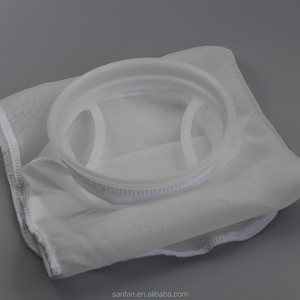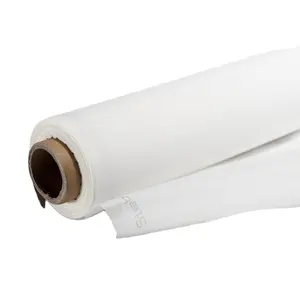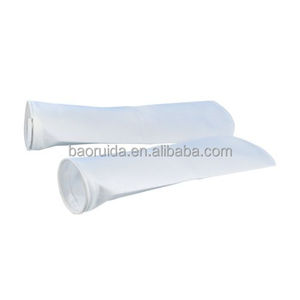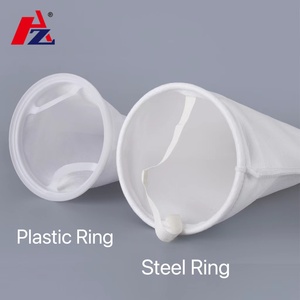(3369 products available)





































































































































































































































The1-micron nylon filter mesh is a type of filtration mesh with 1-micron nylon fibers. It has various applications across different industries, and its benefits are undeniable. We typically find filter meshes in the pipeline systems of different industries and laboratories, where they filter out impurities and sediments before liquid passes through.
The 1-micron nylon filter mesh weighs approximately 80 grams per square meter, and its apertures measure approximately 1 to 2 microns. This mesh size is sufficient to remove bacteria from sterile media. Bacteria are typically 0.5 to 5 microns in size. The 1-micron nylon mesh can thus filter out any organisms larger than it, making it ideal for general-purpose filtration.
An aperture size smaller than one micron will allow fewer particles to pass through and provide purer liquids, which is ideal for critical applications requiring sterile filtration. However, using a 1-micron mesh is excellent for protecting pumps, strainers, and other processing equipment from accelerated wear and damage caused by larger particles and sediments.
Nylon Filter Mesh by Material is as follows:
Nylon Filter Mesh by Weave Pattern:
The performance of nylon mesh filters is mostly determined by their specifications, including the mesh count, fiber thickness, etc.
Those who sell or use 1 nylon filters should know their specifications so they can choose the most suitable filters for their use cases. They should also know how to clean and maintain them so they can use them for a longer period.
Mesh Count
The number of holes or gaps in a piece of fabric within a specific area determines the mesh count. A filter's mesh size is determined by the mesh count. A bigger mesh count means smaller holes, giving finer filtration. Filters with 45, 60, and 100 mesh counts are common. Higher mesh counts are suitable for filtering out tiny particles, while lower mesh counts allow more significant particles through.
Fiber Thickness
A filter's ability to trap particles while permitting the smooth passage of liquid or air is influenced by its thickness. Filters with thin fibers are appropriate for capturing small particles, whereas those with thicker fibers have better durability and flow rates.
Aperture Size
Aperture sizes are the holes in a filter mesh. These apertures allow two things—liquid and particles—to pass through. The optimum aperture size depends on what one wants to filter. Smaller solid particles require tighter apertures, while larger particles and viscous liquids need larger ones. The choice of aperture size impacts filtration accuracy.
To maintain the performance and longevity of 1 nylon filters, proper maintenance and cleaning are essential.
Routine Inspection
Users should develop a cleaning culture by routinely inspecting their filters. This enables them to see if their filters need cleaning or changing. When inspection reveals clogs or dirt buildup, the filters should be cleaned or replaced to sustain optimal performance.
Gentle Rubbing
Users can gently rub the filter surface from the inside to the outside with their fingers to remove any debris or particles trapped within the mesh. This technique enables them to extract some debris without the use of cleaning agents or tools to initiate the filter's self-cleaning process and is appropriate for light filtration.
Soaking and Rinsing
Soaking and rinsing is a comprehensive cleaning method appropriate for 1 nylon filters used in heavy filtration. Users should soak the filters in warm soapy water or a suitable cleaning solution for 5 to 10 minutes before gently rubbing them to remove embedded debris. After soaking, they should rinse the filters thoroughly with clean water to remove any soap or residual chemicals.
Industry specific needs:
It's crucial to comprehend the requirements in accordance with the particular industries nylon filter meshes are used for. Select the appropriate filter density, size, and material based on aspects like the kind of fluids, volume, temperature, and pressure used.
Quality Assessment:
Examining the nylon's filter mesh's materials and craftsmanship is significant. Choose reputable manufacturers and excellent items to ensure filter performance and durability.
Flexible filtration:
1-micron nylon mesh filters have a precise ability to filter particles. When is essential to filter specific particles selectively, rather than filtering all substances; using them is a good option. This precise filtration should suffice.
Economical filter solutions:
In some cases, 1-micron nylon mesh filters may be more cost-effective than other filtering options. For example, suppose a business requires a low filter accuracy and a large filter volume. In that case, it may be reasonable to use multiple low-cost filters rather than invest in a single, expensive filter with high precision.
Reuse and Environmental Protection:
Nylon mesh filters are typically reusable after washing. Their ability to be reused is crucial for both cost savings and environmental protection. Users can purchase it a few times, depending on the frequency of use, rather than before each use.
Q: What does 1-micron nylon filter mean?
A: Filter mesh with one-micron refers to the mesh's ability to filter out particles up to one micron in size. One-micron nylon filter mesh can remove bacteria, dust mites, and other tiny contaminants.
Q: Which industries use the 1-micron nylon filter mesh?
A: The 1-micron nylon filter is common in the pharmaceutical, food and beverage, water treatment, and chemical industries. It is used in these industries to filter out impurities, contaminants, and particles from liquids and air.
Q: Can the 1-micron nylon filter mesh be cleaned and reused?
A: Yes, one-nylon filter mesh can be cleaned and reused. Nevertheless, reusing the filter mesh will depend on its material and structure. If unavoidably, follow the manufacturer's guidelines to avoid damage during cleaning.
Q: Can the 1-micron nylon filter prevent viruses from entering?
A: Theoretically, a 1-micron nylon filter mesh is capable of filtering out particles that are one micron in size or larger. Nonetheless, the effectiveness of the filter in capturing smaller particles, such as viruses, depends on some factors. These factors include the mesh's construction, the water's flow rate through the mesh, and the particles' shape. Therefore, it's crucial to consider these factors before assuming that a filter will block viruses.